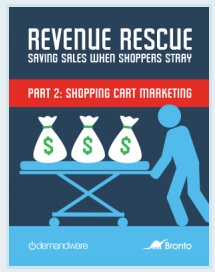The vast majority (93%) of UK retailers do not send follow-up emails to shoppers who have browsed products online but not made a purchase, risking the loss of significant revenue.

The study, from Bronto Software, provides an audit of the product page abandonment and shopping cart abandonment strategies of more than 100 major UK retailers.
The second part of the study unveiled today explores the product page post-abandonment strategies of UK retailers and how they can recover revenue once shoppers have left a product page.
According to the study, 93% of UK retailers do not send follow-up emails to shoppers who have browsed products online but not made a purchase, risking the loss of significant revenue. Even those retailers that are sending product page abandonment emails are taking a softer sales approach than they do when sending similar messages for basket abandonment.
Other findings in this study also show that while product page abandoners might choose to complete their order in a different channel or may have questions about an item, none of the retailers tried to transition shoppers from the site to their preferred channel by doing things such as including customer service contact information or the address of the nearest store.
Additional findings in this study include:
• Just 8% of the emails mentioned the abandoned product in the subject line, with 17% opting to reference the broader product category instead.
• 75% of the product page abandonment emails didn’t make any reference to the browsed item directly, with some using generic subject lines such as ‘Are you still interested in this product?’
• Only one in six (17%) of these reminder messages included related products that offer an alternative item for the customer to purchase – compared to 50% of messages sent by US retailers.
• None of the follow-up messages provided remaining stock levels for abandoned products to create a sense of urgency to return to the product page.
• A third (33%) offered some form of savings or discount as an incentive to make the purchase.
Georges Berzgal, managing director of Bronto Software Europe, commented: “Shoppers have come to expect shopping basket reminders from UK retailers, but product page abandonment messages are clearly still a lesser-used strategy. One reason might be that retailers are hesitant as they consider this approach as too aggressive. It also can be challenging for retailers to know why a shopper left a product page. If implemented correctly, post abandonment messages offer a highly effective means to generate additional revenue”.
“With 93% of retailers not sending product page reminders at all, commerce marketers need to adjust their tactics surrounding this pivotal moment to facilitate the transition or risk losing sales. Abandonment follow-up proves to be an effective strategy in a retailer’s marketing toolbox. Commerce marketing platforms make these types of automated messages easier than it has ever been. Marketers no longer have to spend significant time and resources to set up the programme. The messages can also be tested and modified easily to ensure they reach their maximum revenue recovery potential,” Berzgal added.
The first part of the series, which focuses on shopping cart abandonment, was released in November 2015.
To download the full report, visit Revenue Rescue: Saving Sales When Shoppers Stray.
Research methodology:
More than 100 retailers were randomly selected from a set of over 500 retailers. The total set of retailers and the sample uses may include clients of Bronto and/or Demandware, but any inclusion is random.
